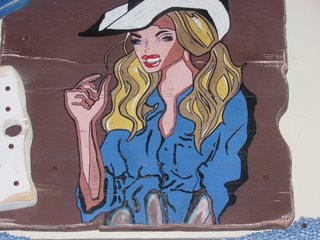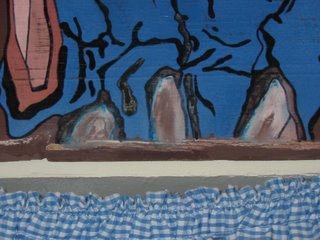Nakedness and Shame
I've been reflecting a lot on the concept of nakedness. When we were in the garden, it wasn't a problem. Then it was. Why? This isn't certainly the end of the theology on the matter, but just a thought. Nudity represents who we are, in all our glory. We were comfortable with who we were. In a Middle Eastern society, for which the story of Eden was written, it is especially true that men should not show their nudity to other men- witness how Ham is cursed by his father later on in Genesis. What changed? When we learned the difference between good and evil, when we learned what they were, we no longer recognized ourselves. We were no longer sure of who we were.
God's question, "Where are you?", was not because he couldn't find us. After all, He knows everything. Rather He was asking us to identify for ourselves our place in the cosmos at that time, and in respect to Him. But we had covered ourselves up, because of our shame.
What had we to be ashamed of? What had changed? Our nakedness quite obviously was still the same. It's clear that the nakedness is a metaphor to who we are, in all our glory, or in all our shame. Even a husband and wife are embarassed to show themselves for the first time the first night together; and in some cultures they never completely show themselves to each other. You are open, vulnerable, showing all of who you are. And we are body-spirits, alone in the creation that we know of, both spirit and body, and therefore one influencing the other. The openness of the body then is not mere metaphor- it partakes in the spiritual openness. This many married couples have discovered for themselves.
After the Fall, we no longer know where we are. We are confused, knowing both good and evil, and no longer know how we stand in relationship to God. And so our answer to "Where are you?" is to respond that we are naked, and hiding. God makes it clear in His next question that the knowledge of nakedness was directly because of learning of both good and evil. Innocence, the lack of knowledge of either, means that we are unaware of our nakedness, and so happy, blissful, and unashamed. I know where I stand in relationship to God, and I am unashamed. Knowing good and evil, I no longer know where I stand in relationship to God, and I look upon myself, and see myself now as unworthy, and am ashamed. Perhaps this is because, upon knowing good and evil, we can in no way see how we can be close to God.
Now, in some societies like the West, there will be attempts to encroach on nudity, or even reach it, beyond what the culture allows. This will then be exported to other cultures, like the Mid-East- one of the crimes that Ossama bin Laden used as an excuse to attack the U.S. on 9/11. But it's not as if we can go back, to the care-free days of nudity, as if everything was like it was in the garden. Because we still carry our shame with us. We still think it's funny, or sexual. I don't speak of cultures like Sub-Saharan Africa or the South Pacific, where topless nudity is the norm- they have a different standard of nakedness. But in any society there is a standard, and when people cross that standard, it is notable. Body nakedness by itself doesn't work, for it doesn't accompany the spiritual nakedness we had in the Garden, when we knew where we were. We must still embrace that.
they have a different standard of nakedness. But in any society there is a standard, and when people cross that standard, it is notable. Body nakedness by itself doesn't work, for it doesn't accompany the spiritual nakedness we had in the Garden, when we knew where we were. We must still embrace that.
I spoke before of Our Lady of the Snack, who hovers above the GWA cafeteria. She was naked, and unashamed. But though she fit into American culture, she did not fit into Moroccan culture, and caused people to go astray. And so the Lord saw fit to provide her with clothing, for she was now in a place where she know longer knew where she was, and was ashamed. But now she has again rejected that clothing. (How, I'm unclear. It certainly can't be Amine, the head of the cafeteria, since he publically claimed to have painted her in previously.) But you can't go back. For what is left is not the pristine beauty of before, but only an ugly smudge, worse than the clothing itself, showing all of the sin laid out for all to see.
Lord saw fit to provide her with clothing, for she was now in a place where she know longer knew where she was, and was ashamed. But now she has again rejected that clothing. (How, I'm unclear. It certainly can't be Amine, the head of the cafeteria, since he publically claimed to have painted her in previously.) But you can't go back. For what is left is not the pristine beauty of before, but only an ugly smudge, worse than the clothing itself, showing all of the sin laid out for all to see.
God's question, "Where are you?", was not because he couldn't find us. After all, He knows everything. Rather He was asking us to identify for ourselves our place in the cosmos at that time, and in respect to Him. But we had covered ourselves up, because of our shame.
What had we to be ashamed of? What had changed? Our nakedness quite obviously was still the same. It's clear that the nakedness is a metaphor to who we are, in all our glory, or in all our shame. Even a husband and wife are embarassed to show themselves for the first time the first night together; and in some cultures they never completely show themselves to each other. You are open, vulnerable, showing all of who you are. And we are body-spirits, alone in the creation that we know of, both spirit and body, and therefore one influencing the other. The openness of the body then is not mere metaphor- it partakes in the spiritual openness. This many married couples have discovered for themselves.
After the Fall, we no longer know where we are. We are confused, knowing both good and evil, and no longer know how we stand in relationship to God. And so our answer to "Where are you?" is to respond that we are naked, and hiding. God makes it clear in His next question that the knowledge of nakedness was directly because of learning of both good and evil. Innocence, the lack of knowledge of either, means that we are unaware of our nakedness, and so happy, blissful, and unashamed. I know where I stand in relationship to God, and I am unashamed. Knowing good and evil, I no longer know where I stand in relationship to God, and I look upon myself, and see myself now as unworthy, and am ashamed. Perhaps this is because, upon knowing good and evil, we can in no way see how we can be close to God.
Now, in some societies like the West, there will be attempts to encroach on nudity, or even reach it, beyond what the culture allows. This will then be exported to other cultures, like the Mid-East- one of the crimes that Ossama bin Laden used as an excuse to attack the U.S. on 9/11. But it's not as if we can go back, to the care-free days of nudity, as if everything was like it was in the garden. Because we still carry our shame with us. We still think it's funny, or sexual. I don't speak of cultures like Sub-Saharan Africa or the South Pacific, where topless nudity is the norm-
 they have a different standard of nakedness. But in any society there is a standard, and when people cross that standard, it is notable. Body nakedness by itself doesn't work, for it doesn't accompany the spiritual nakedness we had in the Garden, when we knew where we were. We must still embrace that.
they have a different standard of nakedness. But in any society there is a standard, and when people cross that standard, it is notable. Body nakedness by itself doesn't work, for it doesn't accompany the spiritual nakedness we had in the Garden, when we knew where we were. We must still embrace that.I spoke before of Our Lady of the Snack, who hovers above the GWA cafeteria. She was naked, and unashamed. But though she fit into American culture, she did not fit into Moroccan culture, and caused people to go astray. And so the
 Lord saw fit to provide her with clothing, for she was now in a place where she know longer knew where she was, and was ashamed. But now she has again rejected that clothing. (How, I'm unclear. It certainly can't be Amine, the head of the cafeteria, since he publically claimed to have painted her in previously.) But you can't go back. For what is left is not the pristine beauty of before, but only an ugly smudge, worse than the clothing itself, showing all of the sin laid out for all to see.
Lord saw fit to provide her with clothing, for she was now in a place where she know longer knew where she was, and was ashamed. But now she has again rejected that clothing. (How, I'm unclear. It certainly can't be Amine, the head of the cafeteria, since he publically claimed to have painted her in previously.) But you can't go back. For what is left is not the pristine beauty of before, but only an ugly smudge, worse than the clothing itself, showing all of the sin laid out for all to see.
Comments
Talk about mixing the sacred and the profane! (or the ridiculous and the sublime)
Nonetheless, I must admit that the Lady's current condition is a fascinating metaphor. It's just going to take me a while to digest the rest of this post so I can figure out what ;)